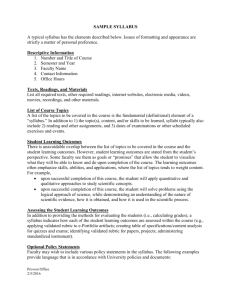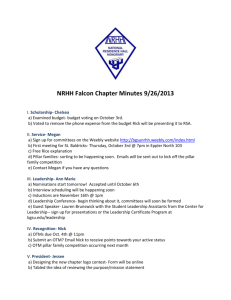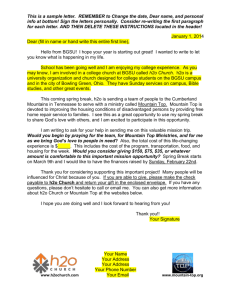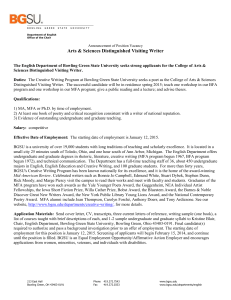BG Perspective Course Approval Form
advertisement
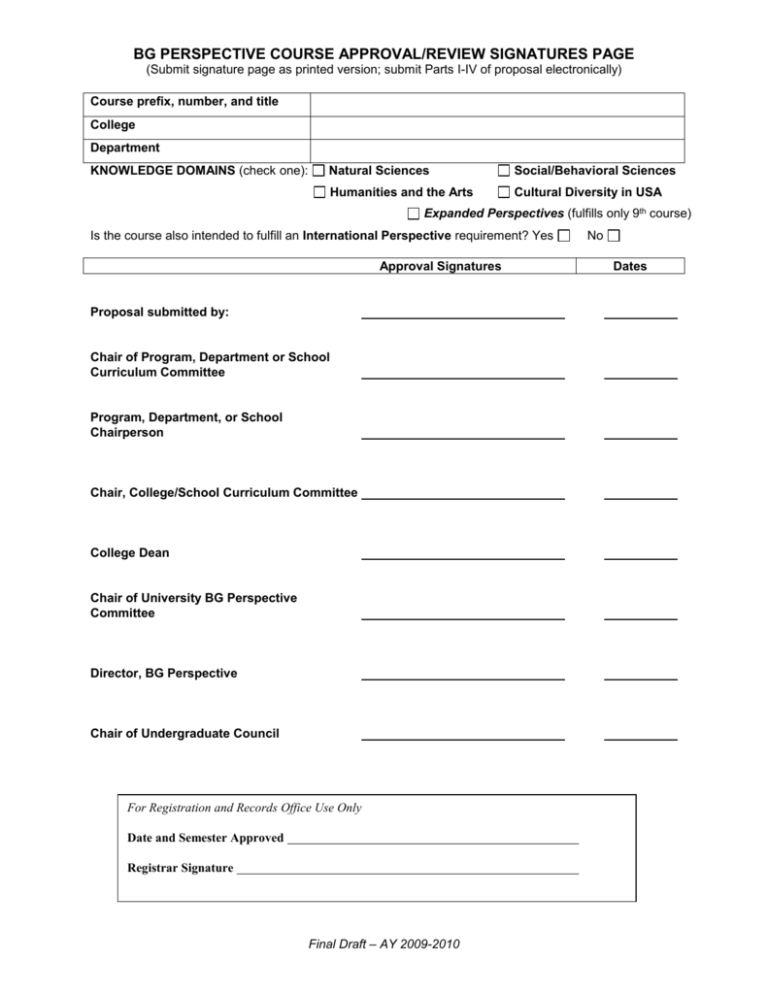
BG PERSPECTIVE COURSE APPROVAL/REVIEW SIGNATURES PAGE (Submit signature page as printed version; submit Parts I-IV of proposal electronically) Course prefix, number, and title College Department KNOWLEDGE DOMAINS (check one): Natural Sciences Social/Behavioral Sciences Humanities and the Arts Cultural Diversity in USA Expanded Perspectives (fulfills only 9th course) Is the course also intended to fulfill an International Perspective requirement? Yes Approval Signatures Proposal submitted by: Chair of Program, Department or School Curriculum Committee Program, Department, or School Chairperson Chair, College/School Curriculum Committee College Dean Chair of University BG Perspective Committee Director, BG Perspective Chair of Undergraduate Council For Registration and Records Office Use Only Date and Semester Approved Registrar Signature Final Draft – AY 2009-2010 No Dates BG PERSPECTIVE PROPOSAL FORM for COURSE APPROVAL/REVIEW (Please submit this form electronically to bgp@bgsu.edu) The BG Perspective Course approval proposal must be completed in order for a course to be considered for inclusion in the University’s BG Perspective curriculum. Departments submitting courses for renewal and review within the BG Perspective program also complete this form. The BG Perspective office encourages you to contact us (dnelson@bgsu.edu or 2-2623) with any questions or for assistance in completing this form. We are here to help! PART I GENERAL COURSE INFORMATION Course prefix and number Course Title Department/School/Program Semester hours of credit Frequency of offering (spring, summer, fall, annually or other) Maximum number students per section Prerequisites Name and contact information for person completing this form PART II INTELLECTUAL SKILLS AND LEARNING OUTCOMES All BG Perspective courses must demonstrate achievement through assessment of intellectual skills along with mastery of the course content. The BG Perspective Intellectual Skills and Learning Outcomes relate directly to BGSU’s newly revised University Learning Outcomes (ULOs). See the University Learning Outcomes at <http://www.bgsu.edu/offices/assessment/page31434.html > and BG Perspective Learning Outcomes at < http://www.bgsu.edu/offices/provost/generaleducation/page45587.html >. MAP THE LEARNING OUTCOMES ASSOCIATED WITH THE COURSE Complete the tables on the next page to identify the degree to which the proposed course achieves one or more of the intellectual skills (a.k.a. student learning outcomes) within each of the three major categories. If the course does not address a specific intellectual skill, circle N/A in the degree of achievement column; if the intellectual skill is minimally addressed or introduced, circle I; circle R (for reinforced) if the intellectual skill is more extensively covered and extends coverage from other courses; finally, if a student is expected to achieve the intellectual skill or learning outcome at an advanced proficiency level, circle the P. For approval, it is not necessary for a course to achieve all intellectual skills, only one per category. A 1000 or 2000 level course achieve at least one outcome within each major category (i.e., Critical and Constructive Thinking; Effective Communication; Social Engagement) at the introducing level. A 3000 or 4000 level course will achieve at least one outcome/intellectual skill within each category at the reinforcement level. Be prepared to identify how the achievement of each outcome is directly assessed in the course (i.e., it is not satisfactory simply to identify a grading point system because that only indirectly addresses outcomes). Proposers are encouraged, but not required, to consider using the related VALUE metarubrics to identify the degree to which the intellectual skill (a.k.a. learning outcome) is achieved. The metarubrics can be located at the following URL: <http://www.bgsu.edu/offices/provost/value/index.html >. For example, if the course achieves the intellectual skill at levels 1 and 2 across the metarubric dimensions, it is considered to be introduced; if the intellectual skill is addressed primarily at levels 2 and 3 across the dimensions, it should be rated as reinforced; if the intellectual skill is expected to be achieved at the advanced levels 3 and 4, then it is classified as advanced proficiency. 1 BG PERSPECTIVE PROPOSAL FORM for COURSE APPROVAL/REVIEW (Please submit this form electronically to bgp@bgsu.edu) CRITICAL and CONSTRUCTIVE THINKING Learning Outcome/ Intellectual Skill Circle degree of achievement Inquiry N/A I R P Creative Problem Solving N/A I R P Thinking Critically and Examining Values N/A I R P Provide Examples of Direct Assessment Used (expand cell to describe completely) Proposers are encouraged to consider the VALUE metarubric for Inquiry and Analysis for assessing inquiry; for Creative Problem Solving, you may want to apply the metarubrics for Creative Thinking and Problem Solving; For Critical Thinking and Examining Values, you may find the metarubrics for Critical Thinking and Ethical Reasoning to be useful. Find them at the URL: <http://www.bgsu.edu/offices/provost/value/index.html> EFFECTIVE COMMUNICATION through Writing, Presenting, and Reading Learning Outcome/ Intellectual Skill Circle degree of achievement Writing N/A I R P Presenting N/A I R P Reading N/A I R P Provide Examples of Direct Assessment Used (expand cell to describe completely) To directly assess writing, the proposer may want to consider using the Written Communication metarubric or, alternatively, the General Studies Writing rubrics; the Oral Communication rubric may be useful for assessing the Presenting outcome; the Reading learning outcome can use the Reading metarubric (to be published by July 2009) <http://www.bgsu.edu/offices/provost/value/index.html> ENGAGING OTHERS IN ACTION through Participation and Leadership Learning Outcome/ Intellectual Skill Circle degree of achievement Participation N/A I R P Leadership N/A I R P Provide Examples of Direct Assessment Used (expand cell to describe completely) For both Participation and Leadership outcomes, one assessment alternative may be to use the VALUE metarubrics for Civic Knowledge and Engagement and for Teamwork. You can locate them at: <http://www.bgsu.edu/offices/provost/value/index.html > Other Direct Assessment Activities If you choose to employ other valid assessments to assess the learning outcomes, use the following expandable textbox to provide additional evidence describing types of direct assessment employed to measure achievement of the main University and BG Perspective learning outcomes. Describe explicitly how one knows the degree to which successful students achieve the course student learning outcomes. 2 BG PERSPECTIVE PROPOSAL FORM for COURSE APPROVAL/REVIEW (Please submit this form electronically to bgp@bgsu.edu) Exemplar Teaching-Learning Activities Use the following expandable textbox to describe in detail the teaching-learning activities and learner-centered pedagogies this course uses to achieve the University and BG Perspective student learning outcomes as mapped previously. PART III KNOWLEDGE DOMAINS (check one): Natural Sciences Social/Behavioral Sciences Humanities and the Arts Cultural Diversity in USA Expanded Perspectives Complete this next section if your course intends to also fulfill an International Perspective requirement. Otherwise, skip to the next section) *********************************************************************************************************************** International Perspective For courses proposed to fulfill the International Perspective requirement, please identify which of the following international perspective learning outcomes are achieved (check each that apply): articulate the significance of diverse cultures and their modes of thought; and/or describe how world issues and international connections impact all our lives/ways of life; and/or identify problems and possibilities inherent in global economic, ecological, political, social, and technological systems. Identify the degree to which one or more of the IP learning outcomes are achieved (I=Introduced; R=Reinforced; P=Proficiency) in the same manner as previous learning outcomes. Proposers may find the VALUE Intercultural Knowledge and Competence metarubric to be useful for IP assessment purposes. <http://www.bgsu.edu/offices/provost/value/index.html > ************************************************************************************************************************* Complete the following two sections for all 3000-4000 upper division courses; completion for 1000- or 2000level courses is optional, but encouraged. Otherwise, skip to Part IV to provide representative syllabus. ************************************************************************************************************************* UPPER DIVISION COURSE COMPONENTS In addition to achieving at least one learning outcome in each major category at the Reinforcement or Proficiency level (see explanations on pp. 1-2), each 3000- and 4000-level course must include: Interdisciplinary Reading: Each 3000- and 4000-level course must use two or more different disciplinary resources to study the topics, issues, or problems under consideration in the course. The perspectives must come from two different disciplines (i.e., sociology and theatre; chemistry and biology), not simply different perspectives or sub-disciplines within one discipline (e.g., botany, zoology). 3 BG PERSPECTIVE PROPOSAL FORM for COURSE APPROVAL/REVIEW (Please submit this form electronically to bgp@bgsu.edu) In approximately 250 words, describe what interdisciplinary texts, or texts and/or readings from more than one discipline, are used and how inter-disciplinary study is achieved in and through the course. Required Writing: Each 3000-4000 level course fulfilling BG Perspective requirements must require at least 20 pages of writing by each enrolled student. In the following expandable textbox, please indicate how each student must complete the minimum 20 pages of writing during this course. For assessing samples of student writing, it may be helpful to consult the effective communication category on p. 2 and/or to reference the AAC&U VALUE metarubric for written communication <http://www.bgsu.edu/offices/provost/value/index.html >. ************************************************************************************************************************* Continue to Part IV, Representative Syllabus 4 BG PERSPECTIVE PROPOSAL FORM for COURSE APPROVAL/REVIEW (Please submit this form electronically to bgp@bgsu.edu) PART IV REPRESENTATIVE SYLLABUS Please produce a representative syllabus for this course using the following areas and expandable boxes (feel free to cut and paste from existing documents as appropriate to answer each): Number and Title of Proposed/Reviewed Course Student Learning Outcomes List the student learning outcomes for the course in the expandable text box below. Integration of one or more of these student learning outcomes should relate closely to the primary University Learning Outcomes identified previously (i.e., mapped previously in Part II). (You are encouraged to integrate the broader University Learning Outcomes parenthetically with the student learning outcomes for the course and to reword them as necessary to help students appreciate how they relate to the course content.) For example, upon successful completion of XXX ####, the student will possess skills for applying quantitative and qualitative approaches to study scientific concepts (critical, constructive thinking); or Upon successful completion of XXX ####, the student will demonstrate fluency in writing as they describe the roles that subcultures play in our multicultural democracy (skillful communication). Plan for Directly Assessing the Student Learning Outcomes In addition to providing the methods for evaluating the course (e.g., calculating grades), please indicate how each of the above student learning outcomes are validly and reliably assessed directly within the course (e.g., applying valid rubric to e-Portfolio artifacts; creating table of specifications/ content analysis for quizzes and exams; identifying valid rubric for papers, projects; administering standardized instrument; calibrated peer review) using expandable box. Texts and Readings List all required texts, other required readings, and optional texts (If this is a 300-400 level course, describe the interdisciplinary nature of the texts) using the expandable box. 5 BG PERSPECTIVE PROPOSAL FORM for COURSE APPROVAL/REVIEW (Please submit this form electronically to bgp@bgsu.edu) Other Required Teaching-Learning Materials or Activities In the textbox below identify required active learning and engagement materials including Internet websites, BlackBoard materials such as electronic media, videos, movies, recordings, exhibitions, field trips, and examples of daily in-class and out-of-class learning activities to illustrate unique elements that contribute to student learning in the course. Course Calendar/Schedule/Topical Outline In this expandable textbox section please indicate a day-by-day or week-by-week course calendar in a typical semester indicating the following items: Topic(s), content, and/or skills to be learned Assigned out-of-class readings and assignments Examples of in- and out-of-class learning activities to be employed Feedback and assessments provided to students such as rubrics, examinations, others ************************************************************************************************************************* Actual Course Syllabus In addition to the representative syllabus information provided in Part IV above, please attach an electronic version of at least one actual course syllabus that is distributed to students. Along with this syllabus, it is often helpful to provide electronic examples of teaching-learning activities used in the course to help achieve the student learning outcomes as well as the specific assessment rubrics. It is useful for submitters to provide any other course material electronically that will assist the BG Perspective Committee in understanding how the course under review contributes to student achievement of the University and BG Perspective learning outcomes. 6

